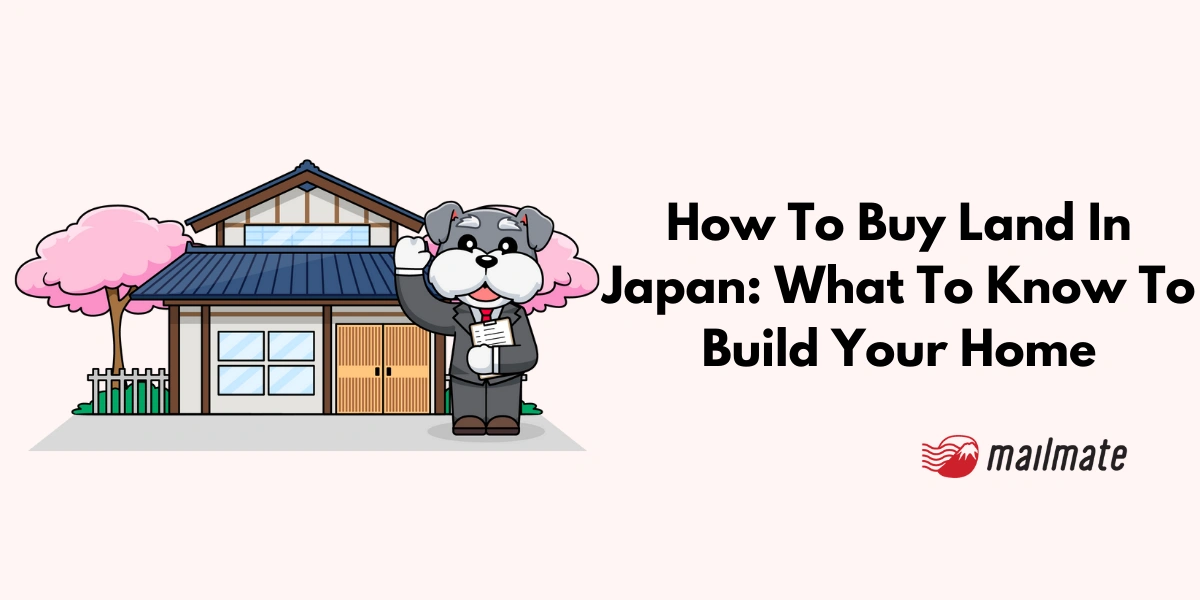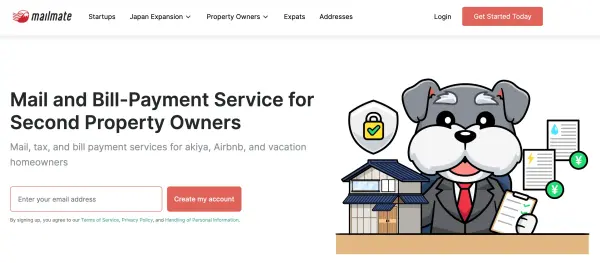How To Buy Land In Japan: What To Know To Build Your Home

Building your dream home often begins with finding the right piece of land.
Whether you're an expat or a permanent resident, anyone can purchase land in Japan.
If you're considering building your dream home here, you've come to the right place. In this guide, we'll walk you through how to buy land in Japan, what to know about property ownership, and the essential steps to take after the purchase.
Quick reference summary
🏠 Can foreigners buy land? Yes, no visa or citizenship required
💰 Total timeline: 6-12 months from search to move-in
📋 Key costs: Land price + 6-10% in fees and taxes + construction costs
📄 Essential requirement: Tax representative (if non-resident)
⚖️ Legal help: Judicial scrivener or lawyer (¥200,000-500,000)
Can foreigners buy land in Japan?
Foreigners can buy land in Japan as it does not require a specific visa, citizenship, or nationality status. So, anyone can buy land and property in Japan. However, buying property in Japan does not give you permanent residency status.
In a nutshell:
No visa requirements: You do not need to be a resident of Japan to buy land.
No additional taxes: Foreigners who buy land in Japan are subjected to the same taxes and fees as Japanese nationals.
Legal requirements and FEFTA rules for buying land in Japan
When making a property purchase in Japan—especially as a foreign buyer—it’s important to understand the country’s land-use laws and reporting obligations.
While Japan does not restrict buying property by nationality, certain types of land require prior approval or post-transaction notification under Japanese law.
1. FEFTA (Foreign Exchange and Foreign Trade Control Act) requirements
Under FEFTA, foreign buyers must follow additional steps when making a land purchase in “sensitive” areas.
Areas that may require FEFTA approval before purchase:
Land near Self-Defense Force bases
Land near coastal defense zones
Remote border islands
Land near nuclear power facilities
Certain designated government security zones
If the land falls into one of these zones, the buyer may need to submit:
Prior Notification (事前届出) → Approval typically takes 30–60 days.
Your real estate agent can confirm if the property is inside a FEFTA-designated zone.
Post-Transaction Reporting (事後報告)
For some non-sensitive zones, foreign buyers must simply file a report with the government within 20 days after purchase. This requirement is procedural and does not affect ownership rights.
2. Agricultural land restrictions (農地法)
Agricultural land (農地) cannot freely be converted or purchased without permission from the Agricultural Committee (農業委員会).
Foreigners—including Japanese residents—must show:
Intent to use the land for agriculture
Proof of farming capability
In some prefectures, proof of full-time residence
For most buyers, agricultural land is not a viable option unless you intend to farm professionally.
3. Forest land restrictions (森林法)
Large forest areas require:
Notification under the Forest Act
Sometimes approval from the Prefectural Governor
The rules depend on size, location, and whether the land falls under a protected forest classification.
4. Land registration requirements
All land purchases must be registered with the Japanese Government Legal Affairs Bureau (法務局).
Documents typically required:
Sales contract
Identification
Seal certificate (for residents)
Tax representative appointment (if non-resident)
Judicial scrivener filing documents
Registration confirms legal ownership and protects your property rights.
A step-by-step guide to buying land in Japan
Step 1: The right location

Many factors affect the total local property market cost. Here are some key factors to consider:
Proximity to amenities: See how close amenities such as schools, hospitals, supermarkets, and transportation hubs are to your property land.
Zoning laws: Japanese zoning laws are likely different from the zoning laws in your home country. (More on this in Step 2.)
Natural disaster risks: Japan is prone to earthquakes and typhoons, so research the area's history with natural disasters.
Future development: Investigate if any planned developments, such as train lines or commercial centers, could affect property value.
Additionally, under the Foreign Exchange and Foreign Trade Act (FEFTA), foreigners cannot purchase land designated as “forest” or “agricultural” without permission.
Step 2: Understand Japanese land categories
When you purchase property in Japan, it's essential to know the three main land categories:
住宅地 (Residential Land): Ideal for building homes or small apartments.
商業地 (Commercial Land): Suitable for business ventures, shops, or commercial buildings.
農地 (Agricultural Land): Primarily for farming; purchasing this type of land may require additional permissions.
If you plan to use the land for residential purposes (a house, etc.), double-check with your real estate agent that the land you will buy is marked as 住宅地 (residential land) so you can build on your property.
Here's a chart that provides other details on Japan's zoning regulations.
Category |
Japanese |
What You Can Build |
Restrictions |
Residential |
住宅地 (jūtakuchi) |
Houses, small apartments, home offices |
Height limits (10-20m), coverage ratios |
Commercial |
商業地 (shōgyōchi) |
Shops, offices, mixed-use buildings |
Higher density allowed, noise considerations |
Agricultural |
農地 (nōchi) |
Farming only |
Special permits required for purchase |
Additionally, you'll want to inquire about the building ratios for the land you are purchasing. Understanding these ratios is crucial for planning your home:
Building Coverage Ratio: Percentage of land your building can cover (typically 30-80%)
Floor Area Ratio: Total floor space allowed relative to land size (typically 50-500%)
Example: On 200㎡ land with 60% coverage and 150% floor ratio, you can build a 120㎡ footprint with up to 300㎡ total floor space.
Step 3: Know your budget and total costs
Buying land in Japan involves more than the price of the land. Here are other things to consider:
Real estate agent fees: the fee is around 3% of the property price, plus tax.
Legal fees: Hiring a lawyer or judicial scrivener is crucial to handling contracts, real estate transactions, and title transfers.
Taxes: You must pay the real estate acquisition tax (1.5-3%) and annual fixed asset taxes (varies by location). 👉 Check out our tax calculator for properties in Japan.
Group credit life insurance: called 団体信用生命保険, dantai shinyō seimei hoken in Japanese. It is a type of life insurance available for home loans.
You'll also need to determine the home building and development cost, including construction, permits, and utilities such as electricity and water connections.
Average land prices in Japan for Tokyo, Osaka, Kyoto, etc. (2024-2025)
Region |
Average Price per ㎡ |
Typical Plot Size |
Total Land Cost |
Tokyo (central) |
¥800,000-1,200,000 |
100-150㎡ |
¥80-180 million |
Osaka (central) |
¥400,000-600,000 |
120-180㎡ |
¥48-108 million |
Kyoto |
¥300,000-500,000 |
150-200㎡ |
¥45-100 million |
Nagoya |
¥200,000-350,000 |
150-250㎡ |
¥30-87.5 million |
Fukuoka |
¥150,000-280,000 |
200-300㎡ |
¥30-84 million |
Rural areas |
¥10,000-100,000 |
300-1000㎡ |
¥3-100 million |
Step 4: The buying process

The buying property process can be condensed into these steps:
Find a Japanese real estate company: Many real estate companies exist in Japan. Find someone you trust, preferably bilingual, to help you navigate the Japanese market. You can also look at akiya banks if you want to buy an akiya and renovate it.
Research the land: Conduct a land survey to determine the property's boundaries and see if the land can support the property structure.
Sign the sales agreement: A sales agreement will be drawn up after agreeing on the price. Fully understand the terms, the payment schedule, and any contingencies.
Pay the deposit: You'll need to pay the deposit to secure the land, which is standard when you purchase real estate in Japan. The deposit is usually non-refundable.
Final payments and land transfer: The remaining balance will be paid later, set up by the sales agreement. You'll need to go to the local government and notify them that you own the land.
Due diligence checklist for land purchase in Japan
Make sure you verify the following before purchasing land in Japan.
Land survey and boundary verification
Soil quality test (地盤調査)
Utility availability (water, gas, electricity, sewage)
Access road width (must be 4m+ for building permits)
Flood zone and disaster risk maps
Zoning regulations and building restrictions
Environmental assessments
Title verification and ownership history
Step 5: Prepare paperwork and documents
Here are some important documents you'll need to help you navigate through Japanese paperwork:
ID Verification: A passport or residence card (for those living in Japan) will be required.
Bank account: Double-check if your bank account can handle overseas transactions.
Inkan (Personal seal): An inkan is used as a notarized signature to sign official documents for those living in Japan.
Additionally, hiring a legal representative, such as a judicial scrivener, is highly recommended, as they can assist with registering your property in Japan if you are purchasing land from outside the country.
Step 6: Building your home

Now that you have your land in Japan, the next step is to build your home, which will require careful planning and coordination.
Here are a couple of things to be aware of during the home building process:
Building permits: After you purchase Japanese real estate, you need to apply for permits to start any construction. Your local real estate agent or a contractor can help with this process.
Hiring a contractor: Hiring a reputable and bilingual contractor or construction company will help you understand Japanese construction standards and allow you to communicate your needs and wants for the house.
Utility setup: You'll want water, electricity, and gas connections set up to avoid delays.
New construction costs in Japan (2024-2025)
On top of property purchase costs, you'll also want to budget for any construction work that you have planned.
Construction Type |
Cost estimate per ㎡ |
150㎡ House Total |
Basic Standard |
¥150,000-200,000 |
¥22.5-30 million |
Mid-Range |
¥200,000-300,000 |
¥30-45 million |
High-End Custom |
¥300,000-500,000+ |
¥45-75+ million |
Step 7: Tax obligations
When you own land or property in Japan, there are a couple of ongoing property taxes and fees that you will need to pay:
Fixed Asset Tax: Paid annually and calculated based on the assessed value of the land and any buildings. About 1.4% of the property’s value.
City Planning Tax: In certain areas, this tax helps fund city infrastructure projects and varies by location. It is 0.2%-0.4% of the property's value.
How to pay Japanese property taxes if you live abroad
Managing taxes and legal documents while owning property in Japan can be complex, especially if you're a non-resident.

That's where MailMate can step in to make things easier.
MailMate offers services designed specifically for foreign buyers and property owners living abroad or away from their Japanese properties for extended periods.
Tax Representative Services: Non-residents must appoint a tax representative to handle tax-related matters, including paying property taxes and receiving tax documents from local agencies. MailMate provides this service, ensuring that all tax payments and official communications are handled seamlessly on your behalf.
Mail Handling: MailMate can receive and manage your important mail, including tax documents, utility bills, and other official correspondence related to your property.
You can ensure that your property and taxes are well-managed, allowing you to enjoy the benefits of owning land and a house in Japan without the administrative burden.
Step 8: After-purchase tips
Once you have your property in Japan, you must register with the local government to notify them that you are the land's new owner.
Register the property: This process is to prove ownership and protect your property rights. You will need to pay a registration fee and license tax in addition to any legal service associated fees.
Insurance: While there’s no legal requirement to purchase insurance when owning land or property in Japan, it’s wise to be prepared for natural disasters. As such, the most commonly chosen types of property insurance are fire and earthquake coverage.
Keep track of legal requirements: Important notices and tax obligations, such as Fixed Asset Tax and City Planning Tax, will be sent by postal mail to your property.
If you want to turn your land into an Airbnb location, you'll have to apply for a minpaku license and a private lodging business certificate. If you plan to make it into your vacation home, be aware of your visa status and how long you are legally allowed to stay in Japan.
💲Mortgage & financing options for foreign buyers in Japan
Whether you are a resident or non-resident determines how easily you can secure financing in Japan.
1. Can foreigners get a mortgage in Japan?
Yes—but it is difficult.
Only a few banks lend to non-residents, and requirements are stricter.
Banks that sometimes lend to foreign buyers:
SMBC Prestia
Shinsei Bank
SBI Shinsei
Some regional banks (case-by-case, often requiring strong ties to Japan)
Most banks require:
Passport
Verified overseas income
Tax returns
Proof of substantial assets
A large down payment
Down payment expectations:
30–50% for non-residents
20–30% for foreign residents with stable work in Japan
2. Mortgages for residents (foreigners living in Japan)
Foreign residents with full-time employment and stable income have more options.
Most Japanese banks offer:
Variable-rate housing loans
Fixed-rate packages
Loans bundled with group credit life insurance (団信)
Requirements typically include:
Residence card
Employment certificate or tax returns
Bank statements
Japanese-language contract signing
A personal seal (inkan/hanko)
Permanent residents get the best terms for housing loans, but many banks lend to non-PR visa holders as well.
3. Can you use overseas income?
Some banks accept:
US W-2 or 1040 filings
Overseas salary statements
CPA-certified income documents
However, many banks only consider income earned inside Japan.
4. Alternative financing options
If Japanese financing isn’t possible:
Cash purchase — Common for non-residents.
Loan from home-country bank — Possible using personal assets as collateral.
Private lenders — Higher interest but easier approval.
Developer financing — Sometimes offered for new-build projects.
5. Mortgage costs (typical)
Assessment & paperwork: ¥50,000–¥150,000
Stamp duty: ¥20,000–¥60,000
Registration tax (reduced rates may apply)
Life insurance for mortgage approval (団信)
Understanding financing options early helps avoid delays in the purchase timeline.
Property management services for non-resident owners
Do you own land or property in Japan but live abroad?
MailMate is here to help you manage your property seamlessly—even when you're not in the country.
MailMate's property management services ensure that all important documents, mail, and property-related communications are handled efficiently on your behalf.
Virtual mailbox

Access all your Japanese mail through your secure online dashboard. You can open and read important letters and notices directly from the dashboard. For unimportant mail, simply click the “Shred” icon, and the item will be physically destroyed.
Need a physical item forwarded? Just submit a request, enter the destination address, and you’ll receive a tracking number once it ships.
Bilingual support
As a foreign property owner in Japan, navigating property-related tasks in Japanese can be challenging.
Whether you need assistance with a gas or water leak inspection, setting up internet service, or installing solar panels, MailMate acts as your bilingual communication bridge—ensuring nothing gets lost in translation.
Frequently asked questions
How much does land cost in Japan?
Land cost varies throughout Japan. The Tokyo Prefecture has the highest average value at almost 1.2 million Japanese yen per square meter. Compared to more rural areas where land prices are about 100 thousand yen per square meter or less.
How long can I live in Japan if I buy a house?
Buying a house in Japan is not directly tied to how long you can live here. Your length of stay is determined by your residency or visa status—not property ownership. For example, if you hold permanent residency (PR), you can live in Japan indefinitely. Otherwise, you can stay as long as your visa remains valid. Some people also stay in Japan on a tourist visa, but this does not grant residency status and typically limits your stay to 90 days per visit.
How much is land tax in Japan?
Land tax in Japan, called fixed asset tax (固定資産税, kotei shisan zei), is about 1.4% of the property's value, which is based on the location, size, condition, and property market trends. The amount is recalculated every 3 years.
Can I buy land while on a tourist visa?
Yes, but you'll need a tax representative and may face banking restrictions.
What happens if I want to sell later?
You can sell freely. Capital gains tax applies (20.42% for non-residents).
What's the minimum down payment for a mortgage?
Typically 20-30% for permanent residents, 30-50% for other visa holders.
Are there any ongoing restrictions on foreign owners?
No ongoing restrictions, but non-residents must maintain a tax representative.
Does buying property help with visa applications?
Property ownership doesn't directly grant visa status, but may support certain applications.
Can I rent out my property?
Yes, but must comply with local regulations and tax obligations.
What happens to my property if I die?
Japanese inheritance law applies. Foreign heirs can inherit but may face tax obligations.
Can I transfer property to family members?
Yes, but gift taxes may apply. Consult a tax professional.
In closing
Understanding how to buy land in Japan—including the related taxes, fees, and steps involved in building a home—can significantly reduce stress and help you move forward with confidence as you purchase and build your dream property in Japan.
As always, if you need additional property management support, MailMate is here to help you.
Spending too long figuring out your Japanese mail?
Virtual mail + translation services start at 3800 per month. 30-day money-back guarantee.

